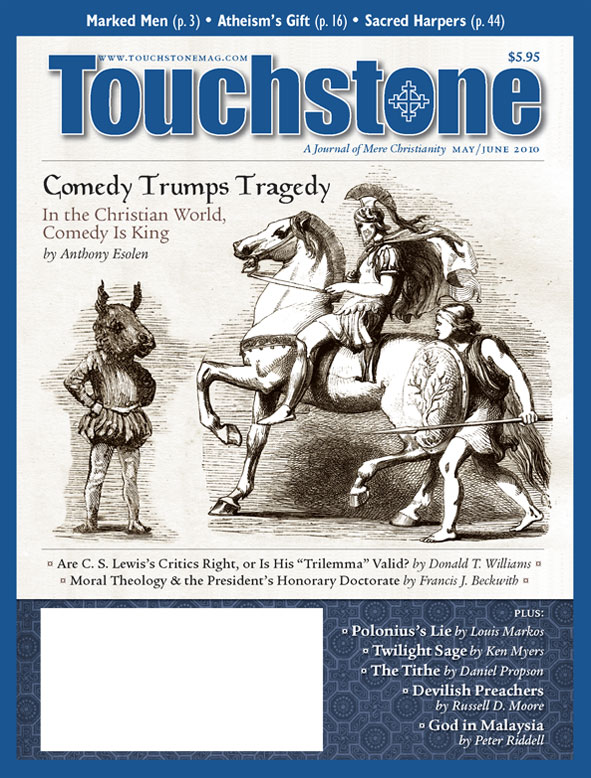Identity Check
Are C. S. Lewis’s Critics Right, or Is His “Trilemma” Valid?
by Donald T. Williams
No argument that C. S. Lewis ever made is more well known—or more controversial—than his famous “Trilemma” (not his word), or “Lord/Liar/Lunatic” (not his phrase) argument for the deity of Christ. N. T. Wright observed accurately in these pages that “this argument has worn well in some circles and extremely badly in others” (“Simply Lewis,” March 2007). Indeed, some of the sharpest critiques have come from within the believing community.
It is ironic that an argument that has become a staple of Christian apologetics should be rejected as fallacious by many who nonetheless presumably accept its conclusion. At stake is not only the validity of a much used argument but also the competence of arguably the greatest apologist of the twentieth century. Are the critics of Lewis’s argument correct? Can we still use the Trilemma? If so, in what way?
Lewis presents the argument in Mere Christianity, in response to a person who says, “I’m ready to accept Jesus as a great moral teacher, but I don’t accept his claim to be God.”
A man who was merely a man and said the sort of things Jesus said would not be a great moral teacher. He would either be a lunatic—on the level with the man who says he is a poached egg—or else he would be the Devil of Hell. You must make your choice. Either this man was, and is, the Son of God: or else a madman or something worse. You can shut Him up for a fool, you can spit at Him and kill Him as a demon; or you can fall at His feet and call Him Lord and God. But let us not come with any patronizing nonsense about His being a great human teacher. He has not left that open to us. He did not intend to. (Bk. II, ch. 3)
The Trilemma is presented not so much as an argument for the deity of Christ as a refutation, a heading off at the pass, of a popular way of evading the claims of Christ. Many non-Christians willingly say Jesus is a great moral teacher; this, Lewis argues, is the one thing we cannot say.
Lewis’s critics contend that his argument commits the fallacy of False Dilemma, the premature closure of options. Marvin D. Hinten alleges that Lewis “overlimits choices.” If it can be shown that there are other legitimate possibilities for how to understand the claims of Christ, it is urged, the argument fails.
These other suggested possibilities fall into two categories. First is the possibility that either Jesus did not actually make the claims attributed to him or, even if he did, he did not mean them as the bald claims to deity for which conservative Christians have taken them.
The second is the possibility that someone could be sincerely mistaken about his identity without being insane in a way that would compromise his views of ethics or his status and authority as a moral teacher.
What Did Jesus Say?
First, it is argued, modern biblical criticism does not allow us to make the naïve assumption that Jesus said everything that the New Testament attributes to him. Few believers are ready to sign up for the Jesus Seminar and question wholesale whether the words of Jesus as reported in the canonical Gospels are authentic. But believers recognize the fact that most secular people today will not begin with a presumption of the authenticity of the Gospels. So, Wright thinks that Lewis’s argument “backfires dangerously when historical critics question his reading of the Gospels.”
This criticism is more a practical than a logical critique of Lewis’s argument. The argument itself simply presupposes that Jesus said and meant the things he is traditionally taken to have said and meant: It treats “a man who was merely a man and said the sort of things Jesus said.” The argument is presented in the form, “If Jesus said and meant these things, this is what follows.” To note that the initial premise is controversial in some circles is not a refutation.
Why does Lewis, though, make an initial assumption that does not appear to be one that we can actually afford to make safely today? It is not because he was unaware of biblical criticism. It seems to me that most critics of Lewis have simply ignored the original audience for the Broadcast Talks that eventually became Mere Christianity: not college-educated people but British laymen during World War II. To bring up the issues of biblical criticism with that audience would have been a foolish introduction to questions most of them were not asking. With another, more skeptical audience, one would have to be prepared to make a case for the authenticity of the Gospel accounts and deal with alternative interpretations first. That Lewis knew of this challenge and was prepared to meet it when appropriate is proved by essays such as his “Modern Theology and Biblical Criticism.”
Lewis’s Trilemma did not, in fact, “backfire” with the audience for whom it was intended, even if it doesn’t work with “historical critics,” a “failure” that Lewis himself would have expected. More could be said about the issue of what Jesus actually said, but we will forego that discussion here because Lewis assumed an audience that was not raising questions of historical criticism. His starting point is acceptance of the Gospel texts as what Jesus really said. And this brings us to the more important question of understanding his words correctly.
What Did Jesus Mean?
Some of Lewis’s critics question whether Jesus’ statements really do add up to a clear and unequivocal claim to deity. All that is needed to deprive Lewis’s argument of its logical force is the probability that Jesus’ words should be taken in some other sense. For some, Lewis’s failure to consider such a possibility robs him of credibility. “Lewis’s view that Jesus’ claims were so clear as to admit of one and only one interpretation reveals that he is a textually careless and theologically unreliable guide,” writes critic John Beversluis in C. S. Lewis and the Search for Rational Religion.
What are these other possible readings? Here things get murky. It is apparently easier to suggest that a greater knowledge of, say, first-century Jewish society would make other readings possible than it is to come up with specific examples. Thus, Beversluis: “Lewis’s discussion suggests that all individuals of all times and places who say the kinds of things Jesus said must be dismissed as lunatics. But this overlooks the theological and historical background that alone makes the idea of a messianic claim intelligible in the first place.” How exactly knowledge of that background would alter the nature of Jesus’ claims is not made clear. The best Beversluis can manage is, “When they did dispose of him, it was not on the ground that he was a lunatic but on the ground that he was an imposter.” (More on that later.)
N. T. Wright takes a different tack, appealing to the “strong incarnational principle” which was the Jewish Temple, the sign of God’s presence among his people. Lewis doesn’t so much get Jesus’ deity wrong as he “drastically short circuits” the original Jewish way of getting there: “When Jesus says, ‘Your sins are forgiven,’ he is not claiming straightforwardly to be God, but to give the people, out on the street, what they would normally get by going to the Temple” (emphasis in the original). By not taking us deeply enough into first-century Jewish culture (at least as understood by Wright), Lewis fails to give us “sufficient grounding in who Jesus really was.”
The Nuanced Jesus
These alternative interpretations of Jesus’ claims are not impressive. How is “When they did dispose of him, it was not on the ground that he was a lunatic but on the ground that he was an imposter” a rebuttal? “Liar” is one of the implied horns of the Trilemma. Isn’t an imposter just one form of liar? Isn’t Liar or Imposter at least as incompatible with Great Moral Teacher as Lunatic?
And Wright seems to expect of his readers a sophistication in modern interpretations of Jewish culture that even the Pharisees of Jesus’ day did not manifest. After Jesus’ declaration that the sins of the paralytic were forgiven, they were not saying, “Who is this who speaks blasphemies? Where can sins be forgiven but in the Temple alone?” but “Who is this who speaks blasphemies? Who can forgive sins but God alone?” (Luke 5:21; emphasis added). In other words, Lewis’s argument deals with the reaction Jesus’ contemporaries actually made to him, not the one Wright thinks they should have made. Wright here tempts me to apply to him Lewis’s verdict from “Modern Theology and Biblical Criticism”: These critics are so adept in reading between the lines that they have forgotten how to read the lines themselves.
Beversluis fares no better when he claims that all that is needed is to suppose that Jesus had been “ authorized to forgive sins by God” (emphasis added), not that he was himself claiming divinity. This again simply ignores the actual reaction by Jesus’ contemporaries. They took Jesus’ words as a claim to deity, and he did nothing to allay their concerns.
In order to understand their reaction, as well as the significance of Jesus’ allowing it to stand, modern readers might imagine the reaction of a radical Muslim fundamentalist to a mere man who claimed to be Allah. It is ironic that Lewis is accused of ignoring the cultural context of the Gospels’ claims for Jesus by people who have obviously failed to make the effort to imagine the fierce monotheism of first-century Judaism—a basic and essential prerequisite to analyzing any contemporary audience’s reaction to the words of Jesus! Far from Lewis’s views of the Gospels revealing him as “a textually careless and theologically unreliable guide” to them, it would seem that the accusation would better fit his critics.
Jesus claimed deity: He made the statements, and he meant what he said. His enemies understood him, and he didn’t correct them. Lewis took the divine claims of Jesus at face value, as has the Church since the beginning. That Christian critics of Lewis fault him on this point may say more about them than about Lewis’s argument.
Mistaken Identity
The other major attempt to show that Lewis failed involves the proposal that a sane person might sincerely but mistakenly believe himself to be God, and that such a mistake would not automatically disqualify him as a great moral teacher.
Beversluis originally asserted, “We could simply suppose that although [Jesus] sincerely believed he was God, he was mistaken,” not lying or insane, just mistaken. He elaborates: “If we deny that Jesus was God, we are not logically compelled to say that he was a lunatic; all we have to say is that his claim to be God was false. The term lunatic simply clouds the issue with emotional rhetoric.”
In a revised edition, he adds documentation from psychological studies of insanity to the effect that “delusional people are deluded about something . . . but they are rarely, if ever, deluded about everything.” Just because a person is deluded about who he is does not necessarily mean that he is deluded about the content of his moral teachings. Beversluis concludes, “The sober answer to the question is No, this is not the kind of blunder that only a lunatic would make.”
While this basic assertion is generally correct, surely its application to the specific case of Jesus requires closer examination. No doubt people may be sincerely mistaken about a lot of things, even having to do with their own identity, without necessarily being insane; and they can even be insane without being wrong about morals.
But we are being asked to believe that a person could be mistaken about a very unusual claim. Jesus said, “Before Abraham was, I Am,” and he was familiar with the standard translation of the Tetragrammaton, the Old Testament name of God, heard by Moses from the Burning Bush: “I Am.”
Professor of English Marvin D. Hinten says that when he teaches Mere Christianity, he asks his class
if they believe angels really did appear to Joan of Arc to say she was God’s chosen instrument to save France. Half the class shake their heads no; the other (quicker-thinking) half simply sit and think it over, because they already see where it is going. None of them see Joan as insane or demonic, so if they apply Lewis’s line of reasoning they will have to admit God really did send angels to Joan, which they have no intention of admitting. I then bring Mohammed into the mix, a man who genuinely seems to have felt Gabriel appeared to him with teaching from God. We discuss ways in which a goodhearted person could be genuinely mistaken about their [ sic] role in life: an idée fixe, a hallucination, etc. (from “Approaches to Teaching Mere Christianity,” The Lamp-Post of the Southern California C. S. Lewis Society, 30:2)
Okay, so the argument goes, you can be mistaken about your identity without being insane. Likewise, you can be mistaken about your identity without it undermining your ethics.
Lewis, Beversluis says, “apparently thought that if certain factual claims Jesus made about himself were false, a disastrous conclusion would follow about the truth, sanity, and reliability of his moral teachings. But why say that?” He goes on to ask, “Did Lewis think that if Jesus were not God, there would no longer be any reason for believing that love is preferable to hate, humility to arrogance, charity to vindictiveness, meekness to oppressiveness, fidelity to adultery, or truthfulness to deception?”
Thus, by this view, the Trilemma fails at every point. You can in theory be mistaken about your identity without being insane and without having false views of ethics. Therefore, Lewis has failed to eliminate the “Great Moral Teacher but not God” assessment of Jesus and hung his apologetic on a fallacious hook. Beversluis asserts, “Contrary to what Lewis claims, we can deny that Jesus was God and say that he was a great moral teacher.”
Mere Identity?
Lewis’s critics succeed in undermining his argument only by use of a clever sleight of hand known as the fallacy of Equivocation. The argument they are critiquing is simply not the one that Lewis made. The criticisms all deal with the general concept of mistaken identity, whereas Lewis is dealing with a very specific case of it, the false claim to be God. Treating these as equivalent is illogical at best and dishonest at worst. But Lewis’s critics have to do it in order to make their criticisms sound plausible.
This weakness becomes clear when we examine the examples Hinten uses to support the claim that mistaken identity does not entail insanity. Let’s assume, for the sake of argument, that Joan of Arc and Mohammed only thought they had seen angels and had a special role in history as a result. In that case, they were mistaken about an experience that they had—and thus about a task or mission they believed they had been given—but not about who they were. One can imagine that they were victims of some kind of hallucination or had some kind of experience that they misinterpreted, and that this could have happened without compromising their general soundness of mind, or their views of ethics. Both of them still knew who they were.
If either of them had claimed to be a ruler of another planet, then we would have an example of mistaken identity, not just of mistaken experiences or communications. Yet even merely mistaken identity, in itself, is not the issue for Lewis, but the sort of mistaken identity.
Joan of Arc and Mohammed did not claim to be God. They did not claim to have existed from eternity in a special relationship with God the Father that made them Lord and gave them the authority to command the elements and forgive sins. They did not claim that they had a prior existence that was omniscient, omnipotent, and omnipresent—all of which is implied in and entailed by the specific nature of Jesus’ claims. They did not claim that he who had seen them had seen the Father. They did not claim to be the Lord of the Patriarchs and Moses, now incarnate in human flesh.
There is a profound difference between all the other claims one can make about one’s identity and the one Jesus made. A person who wrongly believes that he is Napoleon has only confused himself with another finite human being. To believe that one is God compounds a mistake of fact (“I am this being, not that one”) with an error in metaphysics (“I am not a being at all, but the Ground of All Being”). This is not, as Lewis’s critics want to believe, merely a matter of degree. The gap between any creature and the Creator is a difference of kind.
One might object that while the difference between the Creator and the creature is a difference of kind, the claim itself does not so differ from other claims, since all delusions are ontologically false to the same degree, that is, completely. Indeed, all false claims are equally incorrect, but it does not follow that all such errors are equally serious, much less morally equivalent. Claiming to be Napoleon, for example, does not make one guilty of blasphemy. Mistaking one creature for another is an error, conceivably innocent; mistaking a creature for the Creator is idolatry. Such a claim made by a first-century Jewish rabbi would be blasphemous if untrue, and surely not irrelevant to his status as a Great Moral Teacher. Moreover, Jesus did not forbid worship of himself (cf. Matt. 14:33; John 9:38).
Lewis’s critics’ ability to discredit his argument depends on their substituting a different and inferior argument while no one is looking, and getting away with it. When, like Lewis, we remember the radical nature of what Jesus actually claimed, and compare it with the inadequate alternatives proposed against the Trilemma, the attempts to evade its force become impotent.
Sanity & Teaching
A similar lack of attention to what Lewis actually said appears in the attempt to evade his claim about the implications of the relationship between Christ’s identity and his teaching. Beversluis asks, “Did Lewis think that if Jesus were not God, there would no longer be any reason for believing that love is preferable to hate, humility to arrogance, charity to vindictiveness, meekness to oppressiveness, fidelity to adultery, or truthfulness to deception?” But Lewis was not evaluating the moral truth of Jesus’ teaching; he was examining the personal claims made by the Teacher. Lewis’s argument presupposes the self-evident truth of the teachings (cf. Mere Christianity p. 137), which is part of the evidence to be considered in evaluating the sanity of the Teacher.
Lewis is not saying that if Jesus were insane enough to wrongly think he was the omnipotent God, his moral teaching would thereby be refuted. He is saying that the self-evident truth of those teachings and their widely acknowledged superiority to all other attempts to state the same ideals refutes, i.e., is inconsistent with, the notion that their source was a blatant liar or a megalomaniac. Nothing that his critics have said makes those propositions any more consistent than they ever were before. Beversluis’s question is simply beside the point.
In summary, the attempts to show that the Trilemma omits valid but unconsidered options all fail. In order to reject Lewis’s argument, you have to affirm that a person in his right mind can sincerely but mistakenly believe, not simply that he has been visited by an angel, but that he is Almighty God, the Creator of the Universe, and still retain any credibility on anything else he might say. Since very few people are prepared to accept that conclusion, Lewis’s critics are forced to try to undermine his argument by sneakily substituting a straw man for it. Refuting that weak substitution, they then pretend to have refuted the Trilemma. But no reader who is actually paying attention should fall for this shell game—for that is what it essentially is.
Still Strong
Lewis’s Trilemma is still a strong argument and can be used with confidence, especially if we allow it to be nuanced and strengthened by its context in Lewis’s body of writings as a whole. It is unfair to take a paragraph aimed at a lay audience and complain that it is inadequate to deal with people who have a more sophisticated set of issues.
Those issues, especially questions about what Jesus really said, need to be dealt with. Therefore the classic passage from Mere Christianity needs to be supplemented, when used with more sophisticated audiences, by Lewis’s other writings and by information and arguments that have come to light since he wrote.
But the basic argument is sound. It is one thing to claim that it commits the fallacy of False Dilemma; it is quite another to show that other credible and valid options actually exist. Lewis’s critics have failed to do the latter.
Lewis’s position as the dean of Christian apologists remains secure. He was not infallible, but neither was he guilty of writing something in the Trilemma that was “not top-flight thinking,” as Hinten put it. His unique combination of wide learning, no-nonsense clarity, elegant language, and apt analogy remains a standard. When examined carefully, the Trilemma supports that conclusion; it is not an exception to it.
Liar, Lunatic, or Lord? Plunk for Liar or Lunatic if you must. But let’s not come with any patronizing nonsense about how Lewis gave us a fallacious argument. He has not left that open to us. He did not intend to.
Donald T. Williams is Professor Emeritus of Toccoa Falls College. He stays permanently camped out on the borders between serious scholarship and pastoral ministry, between theology and literature, and between Narnia and Middle-Earth. He is the author of fourteen books, including Answers from Aslan: The Enduring Apologetics of C. S. Lewis (DeWard, 2023). He is a contributing editor of Touchstone.
subscription options
Order
Print/Online Subscription

Get six issues (one year) of Touchstone PLUS full online access including pdf downloads for only $39.95. That's only $3.34 per month!
Order
Online Only
Subscription

Get a one-year full-access subscription to the Touchstone online archives for only $19.95. That's only $1.66 per month!
bulk subscriptions
Order Touchstone subscriptions in bulk and save $10 per sub! Each subscription includes 6 issues of Touchstone plus full online access to touchstonemag.com—including archives, videos, and pdf downloads of recent issues for only $29.95 each! Great for churches or study groups.
Transactions will be processed on a secure server.
more on C. S. Lewis from the online archives
more from the online archives
calling all readers
Please Donate
"There are magazines worth reading but few worth saving . . . Touchstone is just such a magazine."
—Alice von Hildebrand
"Here we do not concede one square millimeter of territory to falsehood, folly, contemporary sentimentality, or fashion. We speak the truth, and let God be our judge. . . . Touchstone is the one committedly Christian conservative journal."
—Anthony Esolen, Touchstone senior editor












